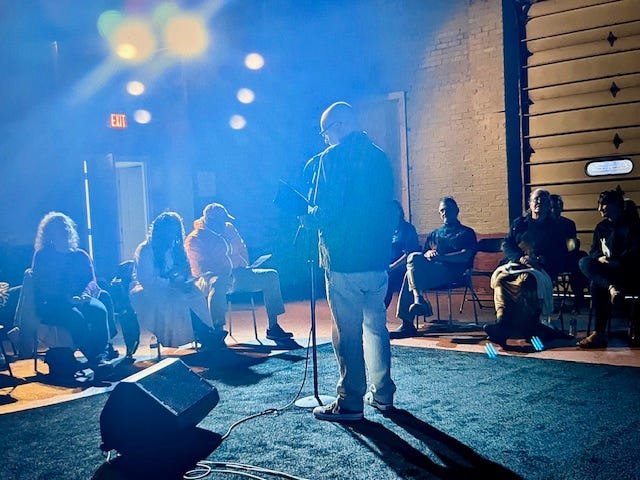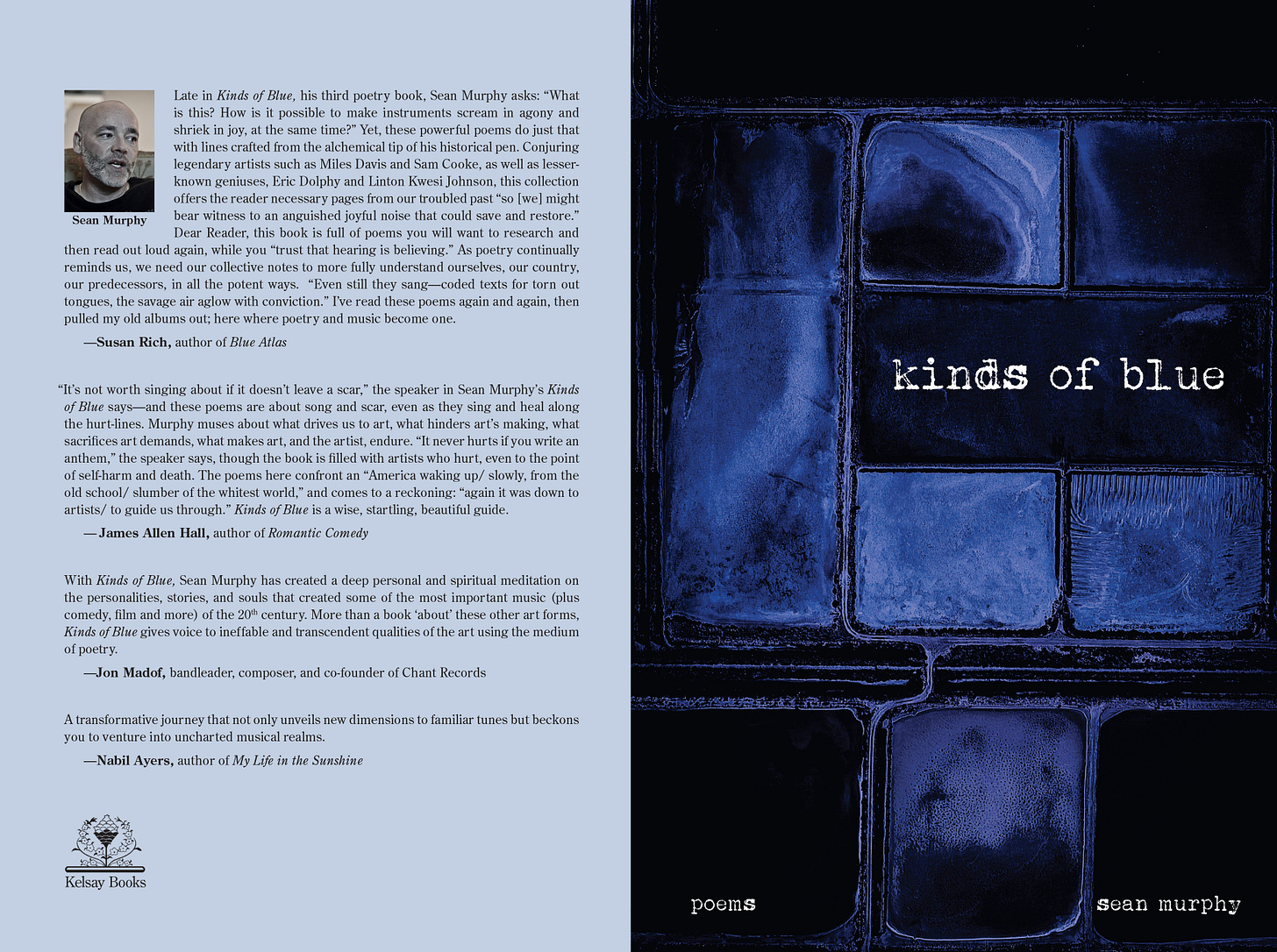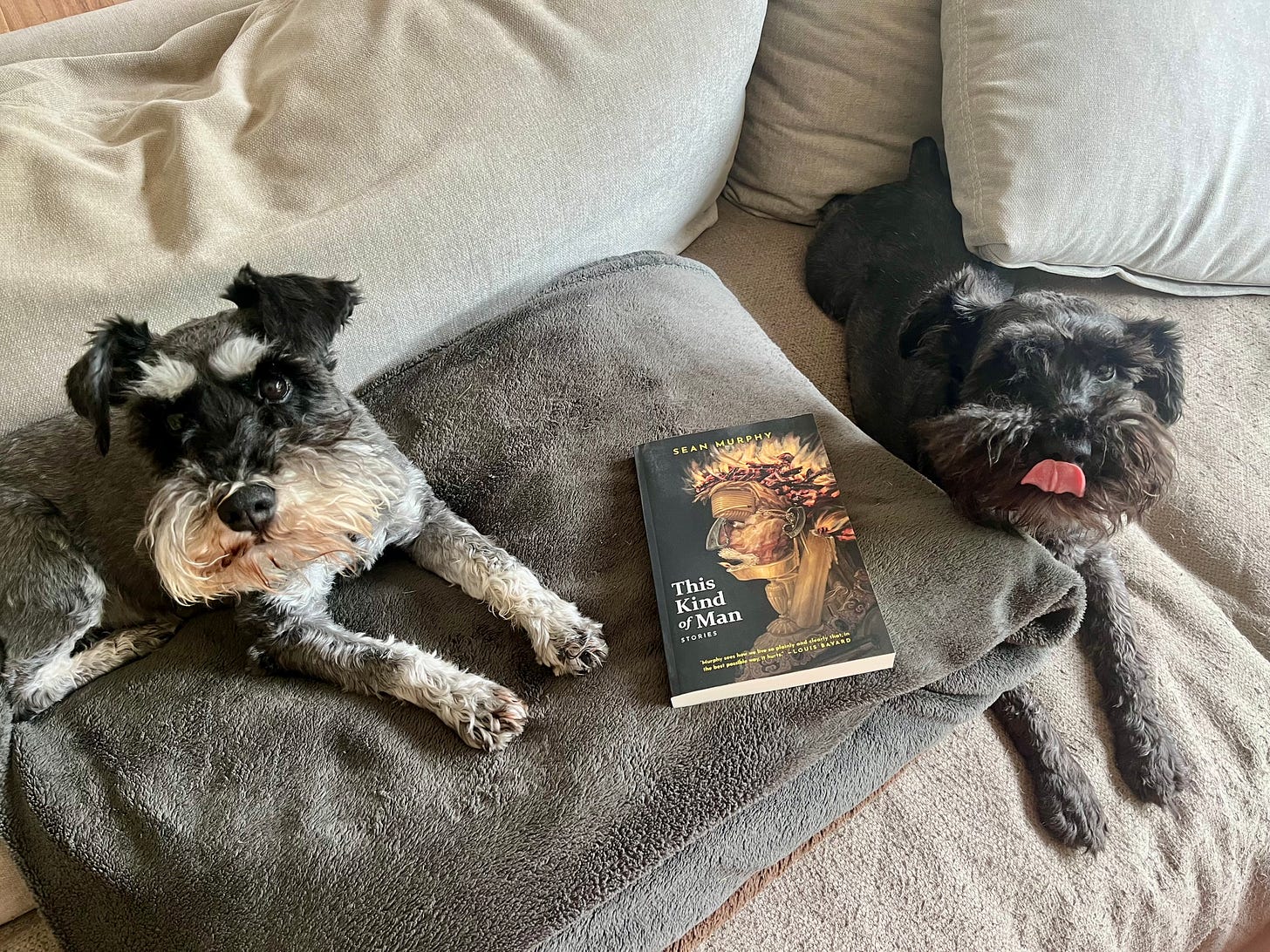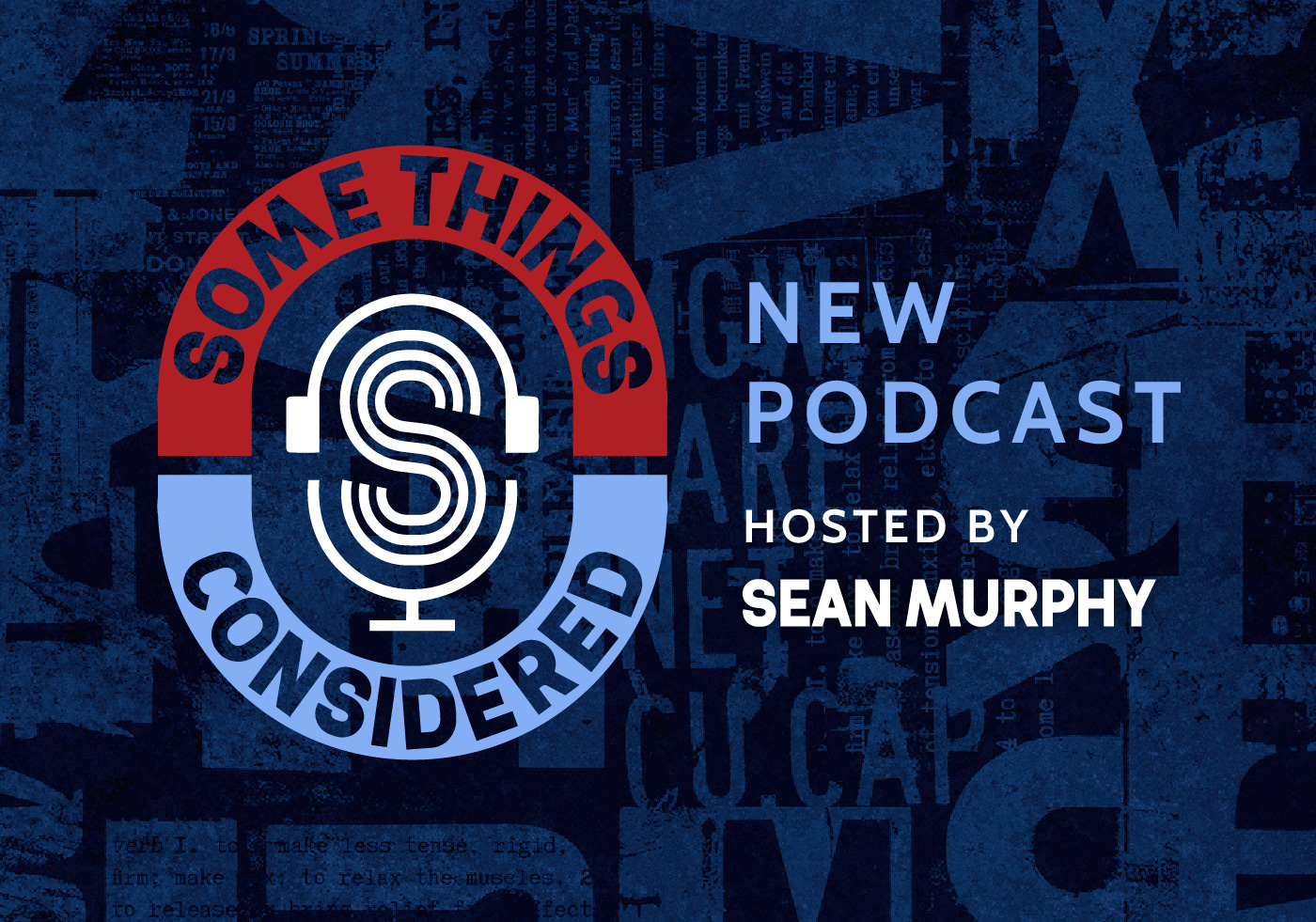2024: A Year in Review at Some Things Considered
Some of my favorite pieces from a productive, tumultuous year
I’m feeling, I hope, the appropriate mixture of gratitude, sense of accomplishment, and exhaustion, as—to paraphrase the immortal Anthony Burgess—(it’s) been a year of some small energy expenditure. Let’s see: I taught a class (“Creativity in Culture”—and it was an enjoyable and enlightening experience); I published my third collection of poetry, and my first collection of fiction. I had some non-fiction, fiction, and a bunch of poems appear in a variety of places, blah blah blah. I also read way too much political reportage, worried too much about same, and continue to feel angry, astonished, bemused, and other things heading into 2025. Let’s focus on the positive.
First, Kinds of Blue (thanks again to Kelsey Books). Below, a description, a blurb, a poem, and a video. For more, including where to buy it (hint: anywhere, everywhere), go here.
Kinds of Blue is the third installment of a large and ongoing project that explores America and its mythology through a series of poems that function as biography, history, and cultural commentary. This collection, like the others before it, honors a number of icons (some well-known; others unfairly neglected), seeking to capture something essential about their lives and the times they lived in, bearing witness while paying homage.
Kinds of Blue carves out a designated space to celebrate black artistry, tracing an at times uneasy but undeniable line stretching from field hollers and the blues, to jazz, funk and beyond. Tributes to misunderstood or mistreated icons include musicians such as Thelonious Monk and Marvin Gaye, fighters like Joe Frazier and Marvin Hagler, and comedians like Richard Pryor and John Belushi. Despite every systemic disadvantage and all the obstacles placed in their paths, these geniuses—and others featured in this book—lived, played, persevered, and became immortal. America is still very much a work in progress, but any country that can claim such inspired forces of nature is worth preserving and celebrating.
With Kinds of Blue, Sean Murphy has created a deep personal and spiritual meditation on the personalities, stories, and souls that created some of the most important music (plus comedy, film and more) of the 20th century. More than a book 'about' these other art forms, Kinds of Blue gives voice to ineffable and transcendent qualities of the art using the medium of poetry.
— Jon Madof bandleader, composer, and co-founder of Chant Records (more about him here, and check him out in conversation with yours truly here).
Albert Ayler’s Vision*
Would-be angels, rejected or returned
to earth, ever eager to share their secrets—
which, suspiciously, all sound the same—
tend to talk about that white light
we’ll all stride toward, transitioning
from here to there, the strangeness
of dead lovers and famous names
(now friends) guiding them forward,
into some impossibly bright beacon.
And why does it always have to be white?
A white god with a white beard dressed
in white (never mind the poor souls
taught to run the other way whenever
they saw men in white robes), looking
like a slick car salesman saying No way
I can make a better deal on this trade-in.
Or consider the revelation of Malcolm X,
reading the dictionary from start to finish
as he bided time in the purgatory of prison,
unlearning what it takes to stay on the right
side of iron bars, figuring out as he did why
they say those who win write our history,
and why white makes right and the wrong
people get blackballed—according to a code
baked into words by the white pie in the sky:
a place where all will be revealed, baptizing
non-believers with the light of white, hot fire.
What did Albert Ayler see when he wept
into the East River, that night he disappeared
forever, having been driven more than halfway
to distraction by the voices that wouldn’t stop,
and why didn’t the Lamb of God put bread inside
his basket when he played the ecstasy of saints
marching in? Did he see a reflection—of himself
or the absent savior who died for his sins—or else
the void of all color & sound as a weary moon hid
behind the clouds (holy ghosts keeping off the record),
unwilling to witness one more force majeure
amongst martyrs, the Devil, and the deep blue sea?
(*Avant-garde saxophonist Albert Ayler made albums at once decidedly—even provocatively—non-commercial, yet deeply spiritual and ecstatic, and like many other jazz musicians, despite being critically acclaimed, he ceaselessly struggled to make a living. In 1969 he wrote an open letter describing his apocalyptic visions and, after being asked why he was wearing a fur coat with his face covered in Vaseline in the summer heat, replied “Got to protect myself.” Ayler was found dead in New York City’s East River on November 25, 1970, a presumed suicide.)
In May, my collection This Kind of Man dropped (thanks again Unsolicited Press!).
This Kind of Man offers an unvarnished look at life in 21st Century America, excavating the complicated, tender, wild truth of what it is to be a man across generations and relationships. These stories interrogate the pressures and tensions of contemporary life, and the ways men grapple with them, often without success. Issues such as marriage, fatherhood, aggression, alcoholism, gender expectations, generational backlash, and the inexorable dread of death, abound.
Many of these stories live within a slow implosion of coping, and often failing, as well as those who refuse to succumb, addressing concerns oft-discussed, or not discussed enough, in mainstream print: gun violence, the recent history of coal country Appalachia, sports-related concussions, illegal immigration (and the jobs many of these ostensibly unwelcome folks are obliged to do), homelessness, and the inability of men to honestly connect or communicate.
Far from excusing or exonerating toxic males, this collection locates their violence (toward others, against themselves) in the context of a deadening culture and the false narratives that prevail in an exploitative, zero-sum game capitalist model, where those without are encouraged to quarrel with similarly overworked and underpaid, mostly blue-collar workers. We see that our received notions of manhood and masculinity are inculcated-from the beginning and by design-to ensure willing participation in a system where the overwhelming majority are excluded from the start. We witness the way these dysfunctions are handed down like inheritance, and how every cliché, from fighting to drinking to intolerance of dissent and distrust of others, is a carefully constructed trap, preventing solidarity, empathy, and love (for others, for one's self).
I’ve written a bunch (and been interviewed several times) about this book which, based on recent electoral events in America, is as timely and relevant as ever. You can read some of the stories here, here, and here, and some of my ruminations here, here, here, and here (and extra thanks to The Good Men Project for an ongoing collaboration that I’m both proud and appreciative of).
Like most writers, I began blogging at some point early this century (a century now almost 25% completed, which is terrifying), but like so many scribblers, I’ve been writing down thoughts and opinions, dreams and fears, reviews and entreaties to secret powers, since grade school (and I still own many of those spiral notebooks and ledgers, which is…terrifying, but also amazing—not that I often if ever am compelled to pull them out of storage). I’m eternally grateful to my great friend Jamey Barlow for insisting I start a proper blog around 2008, and I jumped in with abandon, creating Murphy’s Law, where I’ve been posting on and off ever since. But this year I wanted to make things a tad more formal, organized and…official? I joined Substack, and I love the platform, the people it attracts, and the potential to connect with kindred spirits. I also set what is, for me anyway, a reasonably ambitious goal: to produce three original posts every week. So far, so good; as many writers know, writing is like exercise: you have to keep after it or you don’t improve, and if you don’t do it all the time, it’s hard to complain about lack of results. Here are a few I feel good about.
May, 2024: Murphy’s Laws: 54 Observations on the Occasion of Turning 54
June, 2024: Rebel’s Rebel: Anthony Bourdain, Six Years Gone
July, 2024: Pop Culture, Cynicism, and the ‘70s: 'Chinatown' at 50
August, 2024: The Endless Bummer: On Surfing, and Storytelling
September, 2024: Eating Cats and Dogs
October, 2024: On Weirdness, Part One & Part Two
November, 2024: Our Artists Will Be There (As Usual, As Always)
December, 2024: The Problem with the Homeless Problem
The Author Series via 1455 was—and remains—a blast; what could be better or more gratifying than an intimate conversation with a writer about a work they’ve recently put into the world? I could, and would, do that all day every day, but I have too many other things on the skillet right now, and I also wanted to expand the scope by talking not only to writers, but musicians, and teachers, and people specializing in fields I have no experience much less expertise in. And so, Some Things Considered, a new podcast that kicked off this year. We’ve got two ten episode seasons in the can, and I’ve begun recording for Season Three. What a joy, being able to talk about anything with anyone—but always with a through line around narrative and how we are all telling stories, all the time, no matter what we do (those who do it well tend to rise in their chosen specialties…). I invite you to check it out: subscribe, spread the word, and enjoy!
Okay, now we’re all caught up, mostly, on 2024; if you want a deeper dive on what I’ve been up to the last few decades, jump in here.
Reminder: you can support my non-profit—and help us continue producing free programs every year—here.
If you aren’t already subscribed to Some Things Considered, you can join the party for free, or be a hero and Subscribe-with-a-capital-S (and spread the word with a capital S) here.
Stay safe, keep sane, and be kind. See you next year!







